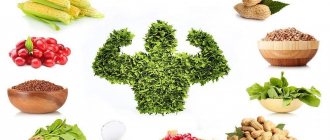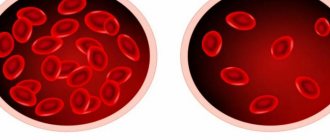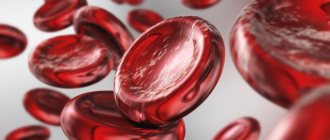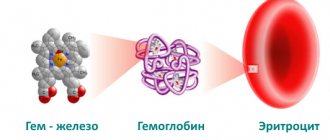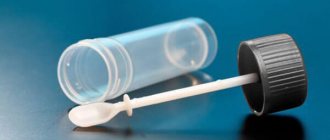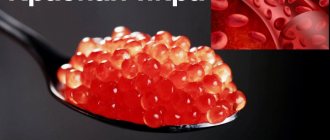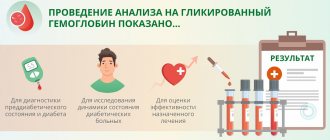HOW TO INCREASE HEMOGLOBIN DURING PREGNANCY
Pregnancy is a special period in a woman’s life, which is also characterized by new needs. Women at this time need about 33 mg of iron, since over 1.4 g of the element goes to the development of the umbilical cord, placenta and fetus, as well as to the formation of additional red blood cells. As a result, in 95–98% of cases, expectant mothers develop iron deficiency anemia. The question of how to increase hemoglobin during pregnancy becomes acute. In each case, the doctor makes a decision individually. First, find out what the expectant mother’s hemoglobin concentration is. The result is compared with the norm. In the first and second trimesters of pregnancy, the hemoglobin level should be no less than 110 g/l, in the third – no less than 105.
Anemia during pregnancy
According to WHO, approximately half a billion women of reproductive age in the world suffer from anemia. According to Rosstat, the course of pregnancy is complicated by the development of anemia in every third patient.
“You’re doing well, but your hemoglobin is a bit low.” - Oh, is that scary? - No, it’s not scary at all. I'll prescribe you a pill, and everything will be fine.
In fact, not everything is so simple - issues of iron deficiency are under the close attention of WHO experts, who recommend considering iron deficiency anemia as a significant risk factor for the death of children in the perinatal period.*
"I have low hemoglobin"
The norms of hemoglobin content in pregnant women differ from the population. From 1972 to the present, during pregnancy, the lower limit of normal for pregnant women is considered to be 110 g/l.
— My hemoglobin was 99 g/l, I took the drug, and after a week my result was 112 g/l. Tell me, doctor, should I continue taking the drug or is it enough?
Cases of “magical” healing are not uncommon. In such situations, it is important to understand how the study was conducted. Unfortunately, in the Russian Federation, a general blood test is still taken “from a fingertip”; the hemoglobin concentration is determined manually, using the obtained capillary blood samples. With this sampling technique, the hemoglobin level can be significantly reduced due to the presence of tissue fluid (the finger was massaged well or pressed hard). The maximum error can be obtained in pregnant women with edema - on average ±10 g/l.
The most accurate results are obtained from an automated venous blood analysis result. This is the method that should be used in everyday practice.
“We treat hemoglobin with iron”
Of course, you want to minimize drug exposure during pregnancy. Moreover, iron supplements are not always well tolerated - nausea, constipation, or diarrhea do not add loyalty to therapy even for the most disciplined patients.
— My hemoglobin is 110 g/l. During the consultation, the gynecologist insists on taking iron supplements, but the therapist says that it is too early. Who is right?
The one who makes the correct diagnosis will be right. A low hemoglobin level requires confirmation of iron deficiency, since anemia can be associated with various factors, and we only treat iron deficiency with iron supplements.
The “gold standard” for diagnosing iron deficiency is to determine serum ferritin levels. Even with a normal number of red blood cells, “good” hemoglobin and hematocrit, a ferritin level of less than 30 ng/ml clearly indicates latent (hidden) iron deficiency. It is at this moment that it is necessary to provide iron subsidies in a prophylactic dose in order to prevent a full-blown anemia. Prophylactic doses of iron are usually well tolerated and can be included in vitamin and mineral complexes.
RISK FACTORS
There are 2 known reasons leading to the development of iron deficiency anemia during pregnancy:
- negative iron balance in the body,
- insufficient supply of microelements. During natural childbirth, a woman loses 0.2–0.25 g of iron, and during multiple births and cesarean section - 0.45. As a result, in 30% of women in labor, the hemoglobin concentration drops to 100 g/l, and in 10% - to 80. Such indicators indicate a moderate severity of anemia. During breastfeeding, there is a further decrease in hemoglobin levels associated with lactation (consumption of at least 1 mg of iron per day).
A deficiency of the element in a pregnant woman's body can cause serious problems, including miscarriage. Therefore, expectant mothers should regularly undergo testing to determine their iron content and hemoglobin concentration.
WHAT MEASURES ARE BEING TAKEN
How to increase hemoglobin during pregnancy using folk remedies
Hemoglobin is an important protein found in the blood. In fact, of course, all the elements are needed, but what is the value of hemoglobin? This substance carries oxygen from the lungs to absolutely all cells of the body. It also removes carbon dioxide.
My patients ask: why is it so important for doctors to control hemoglobin in the blood during pregnancy? I answer that in my practice there were many cases when women ignored the advice of doctors and did nothing to increase hemoglobin. I don’t want to scare anyone, but such actions by a pregnant woman had a very bad effect on the child.
My colleagues also mention this in the article “Iron deficiency anemia during pregnancy.” Therefore, if the tests show low results, always ask how to increase hemoglobin.
Pregnant women often don't want to take pills, so they look for an alternative. The first thing that comes to mind is traditional medicine. If the deviations from the norm are small, I still do not recommend self-medication. Remember that it can harm your health. Therefore, be sure to visit your doctor to get qualified recommendations. If the situation is serious, resorting to folk recipes is completely prohibited, since medication assistance is required.
How to increase hemoglobin? I’ll tell you about several proven means:
- Rose hip decoction.
Rosehip is an extremely useful product for any person. The red berry is rich in various vitamins and minerals. Therefore, many women use rose hips during pregnancy. The decoction is useful not only for reducing swelling and improving kidney function, but also for hemoglobin, since the berries contain iron salts. You can read about this in the article of my colleagues.
Photo: Neumyvakin I. Rosehip. On guard of health. - M.: Dilya, 2008. - 128 p.: UGC
How to increase hemoglobin in the blood using rose hips? Pour 200 g of fruit with a liter of boiling water. Leave for an hour, then strain. You can drink the decoction in small portions throughout the day.
- Health mixture.
This vitamin complex made from natural ingredients is used not only for low hemoglobin. Taking the mixture is beneficial for all people - from young to old. However, especially for pregnant women.
To prepare a magical remedy, stock up on walnuts, dried apricots, prunes and cranberries in advance. You can include raisins in the list. Also get some natural honey.
Mix all solid ingredients in equal parts and grind in any convenient way. Add honey to taste. This vitamin complex should be stored in the refrigerator.
How to quickly increase hemoglobin using a mixture? Eat a tablespoon on an empty stomach. It is also recommended to consume the product throughout the day (up to two spoons).
- Juice therapy.
Products that increase hemoglobin can always be found in the refrigerator. It is most effective to consume them in the form of juices.
There are several options for effective juice therapy. To increase hemoglobin, use the following combinations:
- carrots + beets - mix equally;
- apples + beets in a ratio of 1:5;
- pomegranate juice pure or diluted with water 1:1;
- apples + cranberries - 3:1.
Knowing which foods increase hemoglobin, you can combine all the fruits and vegetables with each other. If the juice seems too concentrated, dilute with water. Drink a couple of glasses of this product throughout the day.
Photo: Romanova O. Healing juices for 100 diseases. - M.: Vector, 2009. - 192 p.: UGC
Some of my patients tried to increase hemoglobin using medicinal herbs. Practical experience shows that during pregnancy it is better to refrain from this method. Not all herbs can be taken while the baby is developing inside. Therefore, it is better to focus on the proposed options. However, take into account that even they can be both beneficial and harmful to the health of a pregnant woman. I do not recommend resorting to self-medication; be sure to consult a doctor.
DIET
Adjusting nutrition towards replenishing the diet with iron-containing foods is designed to prevent a decrease in hemoglobin and the development of anemia during pregnancy. In each case, the condition of the expectant mother, her allergies and individual intolerances are taken into account.
The daily menu must take into account the conditions for consuming ferrocontaining products. For example, milk, tea and coffee impair the absorption of iron, while ascorbic acid, on the contrary, improves it. juices and rosehip decoction can be added to dishes A popular product in the diet to maintain hemoglobin levels are citrus fruits (if you are not allergic to them). They are both rich in iron and ascorbic acid.
Animal products play an important role in the diet to increase hemoglobin during pregnancy , especially beef, white chicken, cod liver, red fish, black and red caviar, offal (liver, kidneys, heart, tongue).
10–20% of iron is absorbed from meat, and only 1–7% from plant foods. This does not mean that you should eat only meat. A pregnant woman's diet should be varied.
To increase hemoglobin levels during pregnancy, the menu includes buckwheat and oatmeal (other cereals, although rich in iron, contain substances that reduce its absorption), dried fruits, fresh vegetables and fruits. Among the fruits , it is recommended to choose apples, pears, peaches, apricots, plums, bananas, persimmons, and quinces. Pomegranates should only be consumed in small quantities, as they can cause allergic reactions and constipation. Among the berries that are rich in iron are black currants, blueberries, cranberries, and strawberries.
A DELICIOUS ADDITION TO THE DIET
To meet a woman's need for iron during pregnancy and maintain normal hemoglobin levels, it is not enough to eat right. Therefore, hematogen may be recommended as an additional measure during pregnancy and breastfeeding. Taking dietary supplements is decided in consultation with a doctor.
"FERROGEMATOGEN®-PHARMSTANDARD" is a dietary supplement that serves as an additional source of mineral elements (iron and copper) and vitamins (pyridoxine hydrochloride, ascorbic and folic acid). It contains black food albumin, vitamins and microelements, which are in the required ratio for high absorption of iron, which is necessary for the synthesis of hemoglobin and the prevention of anemia during pregnancy.
The composition of the dietary supplement optimizes the conditions for absorption and transport of the element to the site of red blood cell synthesis.
- Without copper, normal absorption of iron is impossible. It is involved in the formation of hemoglobin and bones, as well as hematopoiesis, strengthens blood vessels and prevents the development of osteoporosis.
- Ascorbic acid promotes the absorption of iron and blood clotting, takes part in metabolism, and increases the body's resistance to pathogens of infectious diseases.
- Folic acid is involved in hematopoietic processes, cell division, and regeneration of damaged tissues.
- Pyridoxine hydrochloride takes part in the synthesis of proteins and hemoglobin. Without it, the proper functioning of the nervous system is impossible. "FERROGEMATOGEN®-PHARMSTANDARD" is contraindicated in case of individual intolerance and diabetes mellitus. Before using the drug, consultation with a doctor is required.

